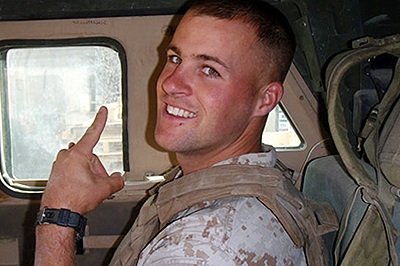As suicide rates and mental health struggles continue to plague veterans after returning home, the U.S. Department of Veterans Affairs (VA) works to improve its programs to help them transition. Part of that effort is the Veterans Outcome Assessment (VOA), a survey that has been conducted annually since 2017. American Directions Research Group (ADRG) has conducted telephone data collection for this survey since its beginning. Here’s why the insights found from speaking to veterans about their mental health care experience are so important.
Clay Hunt’s Story
Clay Hunt joined the Marine Corps in 2005 and deployed to Fallujah, Afghanistan, in January of 2007. During that deployment, Clay was shot in the wrist by a sniper’s bullet. During that same deployment, he watched a fellow Marine sustain a mortal gunshot wound.
He recovered, went to sniper school, and then re-deployed with the 2nd Battalion, 7th Marine Regiment, to Afghanistan in 2008, before the troop “surge,” and was spread across 10,000 square miles in Helmand and Farah provinces. Sixteen Marines and a Navy corpsman were killed in combat there, and scores more were wounded.
Clay left the Marine Corps shortly afterward. He struggled with depression, panic attacks, and posttraumatic stress but threw himself into veteran’s advocacy and humanitarian work, even traveling to Haiti in 2010 with other Marine veterans to help after a devastating earthquake. He focused on helping other veterans who, like himself, were struggling with mental health conditions.
Then it was over. Clay died by suicide in Houston in 2011. Family and friends said he had been battling the VA to get help as he struggled to find employment and his marriage unraveled.
Clay Hunt’s story exemplifies how men and women often return from war without sufficient support to help them transition from combat to life back home. Many were unable to cope and lost their lives as a result. Clay’s story also brought to light the urgency that was needed to address these issues. The Clay Hunt Suicide Prevention for American Veterans Act was passed in 2015 to do just that. It helps veterans experiencing mental health issues such as PTSD or depression and improves the VA’s mental health care and suicide prevention programs.
The Veterans Outcome Assessment Survey
Beginning in 2017, ADRG was awarded the first contract to conduct telephone survey data collection for the Veterans Outcome Assessment Survey (VOA). ADRG has conducted a new wave of this survey annually since then. ADRG’s superior execution of the initial contract led to a sole-source award for the next period of performance. Annually, ADRG contacts a random sample of veterans to inquire about their experience with mental health care. The survey is administered by telephone to tens of thousands of veterans each year at the time when they are beginning treatment in a mental health program and again after three months.
During the course of the telephone interviews, specific questionnaire modules help identify veterans who may be at risk of suicide. In these cases, ADRG interviewers (all of whom have undergone Human Subjects Testing training and are under the supervision of a Ph.D.-level Clinical Director) will transfer the veteran to intervention personnel staffing the Veterans Crisis Line.
Impact of the Survey on Mental Health Among Veterans
This survey complements VA's evolving program in measurement-based care by providing additional data that can be useful for program evaluation, including assessments of patients who have not been seen for ongoing mental health care. VOA findings confirm differences in outcomes between patients who have continued to be seen for treatment and those who have not.
For example, patients who reported discontinuing care because they did not want or need treatment improved more. Those who discontinued due to problems improved less than those who remained in treatment. The VA has since used this data to consider strategies needed to improve veteran satisfaction.
Supporting Veterans Is Part of Who We Are
American Directions Research Group has been a veteran-owned business since its founding in 1987. While all of our clients are meaningful to our team, the work we do on behalf of our nation's heroes means the most. We look forward to continuing this important work.
For additional information on this survey or our telephone data collection capabilities, contact ADRG today.


